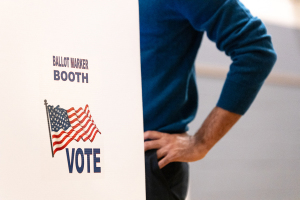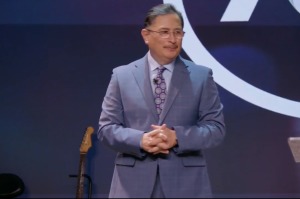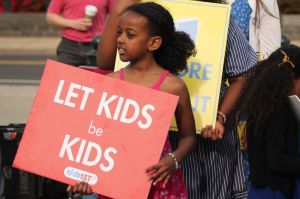Most parents favor age restrictions on books in school libraries: survey
Over 56% want to know 'everything their child checks out'

Most parents want age restrictions placed on sexually explicit books in school libraries yet maintain trust in librarians to select appropriate materials for their collections, according to a new survey.
The EveryLibrary Institute and Book Riot released the results of a survey titled “Parents’ Perception of School Libraries and Librarians” based on responses from 616 parents and guardians collected throughout the month of December.
When asked if they trusted “school librarians to select appropriate books and materials for school libraries,” 80.65% of respondents answered in the affirmative, while the other 19.35% said they did not trust librarians to make such decisions.
Additionally, 82.35% of parents expressed confidence in school librarians to “recommend age and content-appropriate books and materials to students.” At the same time, most parents (81.44%) stated that they did not “know how school librarians decide if a book should be in the school library’s collection.”
More than half (60.32%) of those surveyed agreed that school libraries should “restrict access to certain books based on a child’s age or require parental permission to check out certain books,” while 56.81% endorsed parents receiving “a notification about everything their child checks out.”
A majority of parents (53.78%) expressed support for parents having the ability to “sign a form indicating that their child cannot access the school library.”
The idea of school libraries having “content rating systems based on their appropriateness for different age groups or contents, similar to the rating systems used for movies, TV shows, or video games” received 80.23% support, while parents were more evenly divided when asked if “school libraries should only contain books appropriate for every age group in the school (i.e., the youngest and most sensitive readers).” Just under half (49.54%) favored such a proposal, while 50.46% opposed it.
The survey also asked parents to rate how comfortable they were with the presence of various controversial themes in children’s books. A plurality of parents (37.24%) classified themselves as “not comfortable” with “LGBTQ+ characters and themes in children’s books,” while 34.52% insisted they were “very comfortable” with such content in books geared toward younger readers and 28.24% were “somewhat comfortable.”
A majority of parents surveyed (52.32%) were “very comfortable” with “children’s books about social justice,” while pluralities of parents identified themselves as “very comfortable” with “children’s books about race/racism” (47.53%) and “children’s books about puberty and sexual education” (40.47%).
EveryLibrary Institute, which describes itself as a nonprofit organization “that supports library funding in the United States,” conducted the survey as part of an ongoing series examining parents’ views about libraries. Previous installments focused on parents’ views about public libraries and librarians.
John Chrastka, director of the EveryLibrary Institute, identified the latest findings about school libraries and librarians as a “mixed message” in a statement issued following the survey's release.
“On one hand, there is a clear and strong affirmation of the value of school libraries and the professionals who run them, with a majority of parents recognizing the importance of these educational resources in their children’s lives. On the other hand, the survey also reveals deep-seated concerns and divergent views among parents regarding access to certain books and the extent of parental oversight in school libraries,” he said.
Chrastka also cited the “insights about school libraries and librarians” contained in the survey as being reflective of “the complex attitudes of American parents towards education and information access in today’s society.”
Book Riot, a website that characterizes itself as “North America’s largest independent editorial book site,” partnered with EveryLibrary Institute to conduct all three surveys.
“The results of this study show some real tension,” asserted Book Riot’s Kelly Jensen, a former librarian and blogger. “School librarians are viewed as honest and trustworthy, and while the majority of parents do not know how books get on school library shelves, they indicate a desire to know what books their students are borrowing.”
Jensen, a progressive, lamented, “That LGBTQ+ books are still seen as the most likely to be seen as inappropriate for anyone under 18 is chilling. It is not encouraging to see that nearly 1/3 of parents would seek to ban a book from the school library if it made them or their child uncomfortable.”
The publication of the survey comes as the presence of books with sexually explicit content in school libraries, some of which promote pedophilia and underage sex, has ignited a firestorm across the United States. Concerned parents have descended on school board meetings to read aloud excerpts from the books.
Stacy Langton, a parent residing in Fairfax County, Virginia, received national attention for reading aloud sexually charged excerpts of Gender Queer by Maia Kobabe and Lawn Boy by Jonathan Evison at a school board meeting in September 2021. As Langton explained, “One book describes a fourth-grade boy performing oral sex on an adult male,” while “the other book has detailed illustrations of a man having sex with a boy.”
The survey results, as well as the reaction to them by the people who commissioned them, illustrate the divide in the American public on the presence of certain books in school libraries. While some believe removing such books from school libraries is necessary to preserve parental rights, others chastise efforts to pull the books from the shelves as “book bans.”
Ryan Foley is a reporter for The Christian Post. He can be reached at: ryan.foley@christianpost.com



























